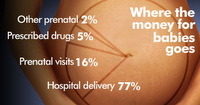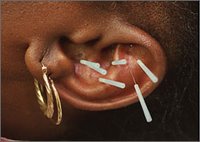| |

Daily Sex Good for Sperm
 For couples trying to conceive, they should have sex everyday. Aside from the obvious, a new study by Dr. David Greening of Sydney IVF, an Australian center for infertility and in vitro fertilization treatment, says daily sex improves the quality of the sperm. Dr. Greening studied 118 men with above-average damage to their sperm DNA. He found that after they ejaculated for seven consecutive days, the quality of sperm increased--dropping 8 percent in the amount of damaged sperm. His advice for those of you ready to do some baby making? "It seems safe to conclude that couples with relatively normal semen parameters should have sex daily for up to a week before the ovulation date," he says. Labels: health, pregnancy, sex, study
Married Couple Never Separate More than 15 Feet Apart
Could you stay within a 15-foot range of your spouse at all times? Husband and wife journalists, David Plotz and Hanna Rosin did just that--for a day. Click on the video below to witness how the day unfolds and the lessons they learned through their new closeness. Labels: entertainment, pregnancy
Married Couple Never Separate More than 15 Feet Apart
Could you stay within a 15-foot range of your spouse at all times? Husband and wife journalists, David Plotz and Hanna Rosin did just that--for a day. Click on the video below to witness how the day unfolds and the lessons they learned through their new closeness. Labels: entertainment, pregnancy
Married Couple Never Separate More than 15 Feet Apart
Could you stay within a 15-foot range of your spouse at all times? Husband and wife journalists, David Plotz and Hanna Rosin did just that--for a day. Click on the video below to witness how the day unfolds and the lessons they learned through their new closeness. Labels: entertainment, pregnancy
Fewer Women Having Kids
 New U.S. Census data reports that 23 percent of women ages 40 to 44 have no children, double the level of 30 years ago. Women who are having children are birthing an average of 1.9 children, compared with the mean average of 3.1 children in 1976. The data shows that women with graduate degrees have fewer children: 27 percent of 40 to 44-year old women with graduate or professional degrees are childless, compared with 18 percent of women who did not continue their education beyond high school. The data further shows that of all the women who had children in 2006, nearly 60 percent worked. These numbers have been leaning this way for a long time. What's your personal experience? Click here to read the complete article from the NY Times. Labels: kids, parenting, pregnancy, study, women
Fewer Women Having Kids
 New U.S. Census data reports that 23 percent of women ages 40 to 44 have no children, double the level of 30 years ago. Women who are having children are birthing an average of 1.9 children, compared with the mean average of 3.1 children in 1976. The data shows that women with graduate degrees have fewer children: 27 percent of 40 to 44-year old women with graduate or professional degrees are childless, compared with 18 percent of women who did not continue their education beyond high school. The data further shows that of all the women who had children in 2006, nearly 60 percent worked. These numbers have been leaning this way for a long time. What's your personal experience? Click here to read the complete article from the NY Times. Labels: kids, parenting, pregnancy, study, women
Fewer Women Having Kids
 New U.S. Census data reports that 23 percent of women ages 40 to 44 have no children, double the level of 30 years ago. Women who are having children are birthing an average of 1.9 children, compared with the mean average of 3.1 children in 1976. The data shows that women with graduate degrees have fewer children: 27 percent of 40 to 44-year old women with graduate or professional degrees are childless, compared with 18 percent of women who did not continue their education beyond high school. The data further shows that of all the women who had children in 2006, nearly 60 percent worked. These numbers have been leaning this way for a long time. What's your personal experience? Click here to read the complete article from the NY Times. Labels: kids, parenting, pregnancy, study, women
Eating Nuts Presents Danger for Pregnant Women
 Dutch researchers say that pregnant women who eat nuts or nut products like peanut butter daily raise the risk their children will develop asthma by 50 percent. According to the findings, moderate amounts don't seem to have any effect. This Reuters article says "scientists do not exactly know why some children develop asthma, although some believe that allergies can trigger the disease that causes a narrowing of the bronchial tubes." While seafood is another food that contains allergens, the Dutch researchers only found a link between peanuts and asthma. The study questioned 4,000 pregnant women on their dietary habits. Their conclusion was that moderate consumption doesn't seem to pose an issue. Labels: health, pregnancy, study
Eating Nuts Presents Danger for Pregnant Women
 Dutch researchers say that pregnant women who eat nuts or nut products like peanut butter daily raise the risk their children will develop asthma by 50 percent. According to the findings, moderate amounts don't seem to have any effect. This Reuters article says "scientists do not exactly know why some children develop asthma, although some believe that allergies can trigger the disease that causes a narrowing of the bronchial tubes." While seafood is another food that contains allergens, the Dutch researchers only found a link between peanuts and asthma. The study questioned 4,000 pregnant women on their dietary habits. Their conclusion was that moderate consumption doesn't seem to pose an issue. Labels: health, pregnancy, study
Eating Nuts Presents Danger for Pregnant Women
 Dutch researchers say that pregnant women who eat nuts or nut products like peanut butter daily raise the risk their children will develop asthma by 50 percent. According to the findings, moderate amounts don't seem to have any effect. This Reuters article says "scientists do not exactly know why some children develop asthma, although some believe that allergies can trigger the disease that causes a narrowing of the bronchial tubes." While seafood is another food that contains allergens, the Dutch researchers only found a link between peanuts and asthma. The study questioned 4,000 pregnant women on their dietary habits. Their conclusion was that moderate consumption doesn't seem to pose an issue. Labels: health, pregnancy, study
Hospitals Do Poorly on Breast-feeding Support
 The Centers for Disease Control and Prevention gave U.S. hospitals an average score of 63 out of 100 for their support of breast feeding. The report says the states in New England and the West Coast had the highest scores, while hospitals in the South recorded the lowest scores. Of those states, Vermont and New Hampshire were tops, both with a score of 81, while Arkansas sat at the bottom with a 48. The MSNBC article says: Breast-feeding is considered beneficial to both mothers and their babies. Breast milk contains antibodies that can protect newborns from infections, and studies have found breast-fed babies are less likely to become overweight than those fed with formula. Have you had a recent experience like this? How would you grade your hospital's breast-feeding support? Labels: health, parenting, pregnancy, study
Hospitals Do Poorly on Breast-feeding Support
 The Centers for Disease Control and Prevention gave U.S. hospitals an average score of 63 out of 100 for their support of breast feeding. The report says the states in New England and the West Coast had the highest scores, while hospitals in the South recorded the lowest scores. Of those states, Vermont and New Hampshire were tops, both with a score of 81, while Arkansas sat at the bottom with a 48. The MSNBC article says: Breast-feeding is considered beneficial to both mothers and their babies. Breast milk contains antibodies that can protect newborns from infections, and studies have found breast-fed babies are less likely to become overweight than those fed with formula. Have you had a recent experience like this? How would you grade your hospital's breast-feeding support? Labels: health, parenting, pregnancy, study
Hospitals Do Poorly on Breast-feeding Support
 The Centers for Disease Control and Prevention gave U.S. hospitals an average score of 63 out of 100 for their support of breast feeding. The report says the states in New England and the West Coast had the highest scores, while hospitals in the South recorded the lowest scores. Of those states, Vermont and New Hampshire were tops, both with a score of 81, while Arkansas sat at the bottom with a 48. The MSNBC article says: Breast-feeding is considered beneficial to both mothers and their babies. Breast milk contains antibodies that can protect newborns from infections, and studies have found breast-fed babies are less likely to become overweight than those fed with formula. Have you had a recent experience like this? How would you grade your hospital's breast-feeding support? Labels: health, parenting, pregnancy, study
Mom's Diets Affect Baby's Sex
 The foods that a woman eats before she's pregnant could have an affect on what sex her baby will be according to a new study published in Proceedings of the Royal Society B, a British medical journal. Eating potassium-rich foods including bananas, having a hearty appetite and not skipping breakfast seemed to raise the odds of having a boy according to the study. The research involved roughly 700 first-time pregnant women in the UK. The women were asked about their eating habits in the year before getting pregnant, according to this article in USA Today. Fifty-six percent of women with the highest calorie intake before pregnancy (but still within a normal, healthy range), had boys. Women who ate at least one bowl of breakfast cereal daily were 87 percent more likely to have boys than those who ate no more than one bowlful per week. The study did have its detractors and also some who said this new research coincides with other signs of a mother's habits predicting their baby's gender. Read the full article here.Labels: food, news, pregnancy, study
Mom's Diets Affect Baby's Sex
 The foods that a woman eats before she's pregnant could have an affect on what sex her baby will be according to a new study published in Proceedings of the Royal Society B, a British medical journal. Eating potassium-rich foods including bananas, having a hearty appetite and not skipping breakfast seemed to raise the odds of having a boy according to the study. The research involved roughly 700 first-time pregnant women in the UK. The women were asked about their eating habits in the year before getting pregnant, according to this article in USA Today. Fifty-six percent of women with the highest calorie intake before pregnancy (but still within a normal, healthy range), had boys. Women who ate at least one bowl of breakfast cereal daily were 87 percent more likely to have boys than those who ate no more than one bowlful per week. The study did have its detractors and also some who said this new research coincides with other signs of a mother's habits predicting their baby's gender. Read the full article here.Labels: food, news, pregnancy, study
Mom's Diets Affect Baby's Sex
 The foods that a woman eats before she's pregnant could have an affect on what sex her baby will be according to a new study published in Proceedings of the Royal Society B, a British medical journal. Eating potassium-rich foods including bananas, having a hearty appetite and not skipping breakfast seemed to raise the odds of having a boy according to the study. The research involved roughly 700 first-time pregnant women in the UK. The women were asked about their eating habits in the year before getting pregnant, according to this article in USA Today. Fifty-six percent of women with the highest calorie intake before pregnancy (but still within a normal, healthy range), had boys. Women who ate at least one bowl of breakfast cereal daily were 87 percent more likely to have boys than those who ate no more than one bowlful per week. The study did have its detractors and also some who said this new research coincides with other signs of a mother's habits predicting their baby's gender. Read the full article here.Labels: food, news, pregnancy, study
Husband and Wife Soldiers Bunk Together
 In a new change in policy, the U.S. military is now allowing husbands and wives to live and sleep together in a war zone. This rule took change back in May 2006. This article from the AP says that there are more than 10,000 couples in the military, although it doesn't specify if "couple" means married. Not that it matters. The military is attempting to boost morale, as well as improve the divorce rates that continue to offer its own mounting numbers of casualties. This article tells some first person stories and also addresses some of the risks, such as an increase in pregnancy. Labels: news, pregnancy, real people, romance
Husband and Wife Soldiers Bunk Together
 In a new change in policy, the U.S. military is now allowing husbands and wives to live and sleep together in a war zone. This rule took change back in May 2006. This article from the AP says that there are more than 10,000 couples in the military, although it doesn't specify if "couple" means married. Not that it matters. The military is attempting to boost morale, as well as improve the divorce rates that continue to offer its own mounting numbers of casualties. This article tells some first person stories and also addresses some of the risks, such as an increase in pregnancy. Labels: news, pregnancy, real people, romance
Husband and Wife Soldiers Bunk Together
 In a new change in policy, the U.S. military is now allowing husbands and wives to live and sleep together in a war zone. This rule took change back in May 2006. This article from the AP says that there are more than 10,000 couples in the military, although it doesn't specify if "couple" means married. Not that it matters. The military is attempting to boost morale, as well as improve the divorce rates that continue to offer its own mounting numbers of casualties. This article tells some first person stories and also addresses some of the risks, such as an increase in pregnancy. Labels: news, pregnancy, real people, romance
How Much Does a Pregnancy Cost?
 The numbers are a few years old, but interesting nonetheless. In 2004, the average uncomplicated pregnancy cost was $7,539 according to numbers from the Healthcare Cost and Utilization Project. So where is the money going to? 77 percent went to pay for the hospital delivery ($5,819), 16 percent went to prenatal visits ($1,178), 5 percent went to prescribed drugs ($392), and 2 percent went to other prenatal stuff ($151). Have you found that your pregnancy cost more or less than what they're reporting. Again, this data is going on four years old. Labels: money, pregnancy, study
How Much Does a Pregnancy Cost?
 The numbers are a few years old, but interesting nonetheless. In 2004, the average uncomplicated pregnancy cost was $7,539 according to numbers from the Healthcare Cost and Utilization Project. So where is the money going to? 77 percent went to pay for the hospital delivery ($5,819), 16 percent went to prenatal visits ($1,178), 5 percent went to prescribed drugs ($392), and 2 percent went to other prenatal stuff ($151). Have you found that your pregnancy cost more or less than what they're reporting. Again, this data is going on four years old. Labels: money, pregnancy, study
How Much Does a Pregnancy Cost?
 The numbers are a few years old, but interesting nonetheless. In 2004, the average uncomplicated pregnancy cost was $7,539 according to numbers from the Healthcare Cost and Utilization Project. So where is the money going to? 77 percent went to pay for the hospital delivery ($5,819), 16 percent went to prenatal visits ($1,178), 5 percent went to prescribed drugs ($392), and 2 percent went to other prenatal stuff ($151). Have you found that your pregnancy cost more or less than what they're reporting. Again, this data is going on four years old. Labels: money, pregnancy, study
Cell Phones Stump Fertility?
 Preliminary studies suggest that cell phone use by men could harm their fertility. The study was done on 361 men under 40 who were being evaluated for infertility at the Cleveland Clinic Foundation; men whose personal or family history might explain a low count or other sperm abnormalities were excluded. Long story short, those who talked more than four hours a day had lower counts and more poor "swimmers" and abnormally formed sperm. Before you hang up your cell phone fellas, the authors of the study did concede that their could be hundreds of other variables that could have contributed to their findings. Click here to read the full article.Labels: health, pregnancy, study
Cell Phones Stump Fertility?
 Preliminary studies suggest that cell phone use by men could harm their fertility. The study was done on 361 men under 40 who were being evaluated for infertility at the Cleveland Clinic Foundation; men whose personal or family history might explain a low count or other sperm abnormalities were excluded. Long story short, those who talked more than four hours a day had lower counts and more poor "swimmers" and abnormally formed sperm. Before you hang up your cell phone fellas, the authors of the study did concede that their could be hundreds of other variables that could have contributed to their findings. Click here to read the full article.Labels: health, pregnancy, study
Cell Phones Stump Fertility?
 Preliminary studies suggest that cell phone use by men could harm their fertility. The study was done on 361 men under 40 who were being evaluated for infertility at the Cleveland Clinic Foundation; men whose personal or family history might explain a low count or other sperm abnormalities were excluded. Long story short, those who talked more than four hours a day had lower counts and more poor "swimmers" and abnormally formed sperm. Before you hang up your cell phone fellas, the authors of the study did concede that their could be hundreds of other variables that could have contributed to their findings. Click here to read the full article.Labels: health, pregnancy, study
Don't Neglect Marriage After Baby Arrives
 An article from AZCentral.com tells the story of new parents and how the child has changed their marriage. At the end of the article, there are many tips for new parents to think about. The tips are broken down into frequency: daily, weekly, monthly and annually. Some of their tips include: make time to talk, go out on a date at least once a week, get away for one night every month, and plan at least one getaway vacation once a year. A point they make at the end of the article is that eventually the children will grow up and leave. If you've nurtured your relationship throughout parenthood, you'll have fun for many years to come. Click here to read the full article.Labels: advice, family, kids, parenting, pregnancy
Don't Neglect Marriage After Baby Arrives
 An article from AZCentral.com tells the story of new parents and how the child has changed their marriage. At the end of the article, there are many tips for new parents to think about. The tips are broken down into frequency: daily, weekly, monthly and annually. Some of their tips include: make time to talk, go out on a date at least once a week, get away for one night every month, and plan at least one getaway vacation once a year. A point they make at the end of the article is that eventually the children will grow up and leave. If you've nurtured your relationship throughout parenthood, you'll have fun for many years to come. Click here to read the full article.Labels: advice, family, kids, parenting, pregnancy
Don't Neglect Marriage After Baby Arrives
 An article from AZCentral.com tells the story of new parents and how the child has changed their marriage. At the end of the article, there are many tips for new parents to think about. The tips are broken down into frequency: daily, weekly, monthly and annually. Some of their tips include: make time to talk, go out on a date at least once a week, get away for one night every month, and plan at least one getaway vacation once a year. A point they make at the end of the article is that eventually the children will grow up and leave. If you've nurtured your relationship throughout parenthood, you'll have fun for many years to come. Click here to read the full article.Labels: advice, family, kids, parenting, pregnancy
Get Stuck With Needles, Get Pregnant
 The University of Maryland School of Medicine published a study in the British medical journal, BMJ which says acupuncture may help women get pregnant. To be most effective, they say acupuncture should be done right before or after embryos are placed in the womb. The study was based on 1,366 women in the U.S., Germany, Australia and Denmark who are having in vitro fertilization. The article from USA Today says this: Individually, only three of the studies found acupuncture beneficial, three found a trend toward benefit and one found no benefit. When results of these smaller studies were pooled, researchers found that the odds of conceiving went up about 65% for women given acupuncture. Experts say that there is still a lot of research that needs to be done, but also say that while the benefit of acupuncture still needs more studying, there's never been anything to show that it's harmful--so why not give it a try? Have any of you ever done acupuncture in hopes of getting pregnant? Did it work? Labels: parenting, pregnancy, study
Get Stuck With Needles, Get Pregnant
 The University of Maryland School of Medicine published a study in the British medical journal, BMJ which says acupuncture may help women get pregnant. To be most effective, they say acupuncture should be done right before or after embryos are placed in the womb. The study was based on 1,366 women in the U.S., Germany, Australia and Denmark who are having in vitro fertilization. The article from USA Today says this: Individually, only three of the studies found acupuncture beneficial, three found a trend toward benefit and one found no benefit. When results of these smaller studies were pooled, researchers found that the odds of conceiving went up about 65% for women given acupuncture. Experts say that there is still a lot of research that needs to be done, but also say that while the benefit of acupuncture still needs more studying, there's never been anything to show that it's harmful--so why not give it a try? Have any of you ever done acupuncture in hopes of getting pregnant? Did it work? Labels: parenting, pregnancy, study
Get Stuck With Needles, Get Pregnant
 The University of Maryland School of Medicine published a study in the British medical journal, BMJ which says acupuncture may help women get pregnant. To be most effective, they say acupuncture should be done right before or after embryos are placed in the womb. The study was based on 1,366 women in the U.S., Germany, Australia and Denmark who are having in vitro fertilization. The article from USA Today says this: Individually, only three of the studies found acupuncture beneficial, three found a trend toward benefit and one found no benefit. When results of these smaller studies were pooled, researchers found that the odds of conceiving went up about 65% for women given acupuncture. Experts say that there is still a lot of research that needs to be done, but also say that while the benefit of acupuncture still needs more studying, there's never been anything to show that it's harmful--so why not give it a try? Have any of you ever done acupuncture in hopes of getting pregnant? Did it work? Labels: parenting, pregnancy, study
|
 |
|
 |
 For couples trying to conceive, they should have sex everyday. Aside from the obvious, a new study by Dr. David Greening of Sydney IVF, an Australian center for infertility and in vitro fertilization treatment, says daily sex improves the quality of the sperm. Dr. Greening studied 118 men with above-average damage to their sperm DNA. He found that after they ejaculated for seven consecutive days, the quality of sperm increased--dropping 8 percent in the amount of damaged sperm. His advice for those of you ready to do some baby making? "It seems safe to conclude that couples with relatively normal semen parameters should have sex daily for up to a week before the ovulation date," he says.
For couples trying to conceive, they should have sex everyday. Aside from the obvious, a new study by Dr. David Greening of Sydney IVF, an Australian center for infertility and in vitro fertilization treatment, says daily sex improves the quality of the sperm. Dr. Greening studied 118 men with above-average damage to their sperm DNA. He found that after they ejaculated for seven consecutive days, the quality of sperm increased--dropping 8 percent in the amount of damaged sperm. His advice for those of you ready to do some baby making? "It seems safe to conclude that couples with relatively normal semen parameters should have sex daily for up to a week before the ovulation date," he says.











